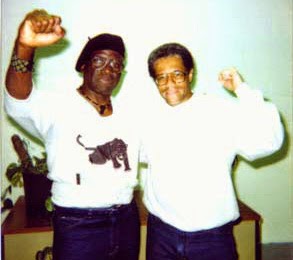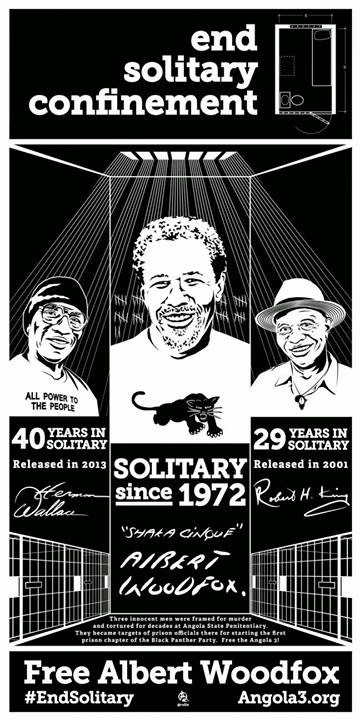(Herman Wallace, left, with Albert Woodfox, right)
A3N: The
Angola 3 and supporters have always argued that the convictions of Herman and
Albert for the murder of prison guard Brent Miller, were a frame-up
orchestrated in retaliation for Herman and Albert's political activities as BPP
organizers. Do you consider this to be a credible argument? Do you consider
their convictions and placement in solitary confinement to be politically
motivated?
AB: Yes to both. One should not overlook the timing of the
government's plot to neutralize the BPP and the timing of the
(post-incarceration) convictions of Robert King, Albert Woodfox and the late Herman
Wallace. They were openly acting as BPP members at a time when the government
was on a mission to neutralize the BPP.
Years
removed, we have learned of many BPP members who were framed for crimes they
did not commit and who were subsequently submitted to prolonged solitary
confinement while in prison. Some of these are referenced in the article. False
convictions were used as a means of neutralization and solitary confinement was
used to break their wills and end their activism. This is no longer
speculation. This is now a documented fact.
When
one looks at the lack of credible evidence in the Angola 3 case and couples it
with the public statements of official actors, which cement (not suggest) the
belief that the Angola 3 have been treated as inhumanely as they have because
of their BPP involvement, one can't help but entertain the thought that there
is more at work than the murder of an innocent guard who was met with a fate he
absolutely did not deserve.
(PHOTO: BPP collage by
Its About Time BPP.)
A3N: On a personal level, after researching the
BPP and writing your article, what do you find most inspiring about the BPP
legacy? What lessons do you think today's activists can learn from studying BPP
history?
AB: The late Derrick Bell is one of my favorite
authors. He teaches that courage can't be gauged until the act that we think is
courageous is viewed in context. Putting the actions of the BPP in its proper social
context makes a case for how courageous they were.
They
watched Martin Luther King attempt change through nonviolent means. They had
seen the emergence of the Deacons for Defense. They had witnessed the Freedom
Riders, who were young and innocent children harmed as well as many other
protesters who were savagely beaten, killed and/or jailed for doing nothing
more than attempting to make America a just place (and doing so in a nonviolent
way and without being armed). They knew that law enforcement often acted to
uphold segregationist laws and policies. Police regularly treated activists,
protestors and those practicing civil disobedience as common criminals and many
dished out violence in generous portions at civil rights events. Not
intimidated by this, the Panthers still took center stage. They teach us
penetrating lessons in courage.
Most
of the Panthers were very young. They had nothing more than a thirst for
change, a will to work hard in service to others and a commitment to studying
other change agents in an effort to craft a strategy for change in this
country. They illuminate the point that, to make meaningful and eternal change,
one does not have to be a certain age and one does not have to have titles or
credentials. They also teach us that world changers can't be impulsive, reactionary
or emotional people. Instead, they must be visionaries and wise strategists who
are measured in their reactions and deliberate in their actions. The Panthers
were proponents of (legitimate) education and everything they did was done after
much study and deliberation. This should not be overlooked.
Most
inspiring is their selflessness and genuineness. They served the people out of
love. They did not seek payment or votes. They did not come with an agenda.
They teach us a lot about our current leaders who will often do nothing without
the promise of pay, glory or promotion.
A3N: Based
upon your research and examination of the topic, why do you think Cain and
others like him continue to misrepresent what the BPP was about?
AB: There is an explanation for why the
misrepresentation of the BPP has continued all these years, but it is
complex.
The
initial reason for the perception of the BPP being violent and racist is the
government itself. The declassified
documents verify that a part of its neutralization strategy was to discredit
them in the public's eye. This was done in an attempt to stop people from
joining, following or supporting the party. The article lists the myriad of
ways this plan was brought to fruition. One way was to use infiltrators and
informants to join the party then have these individuals behave badly and
violently so it would appear that the BPP was nothing more than a group of
thugs and outlaws. Another way the government contributed to the negative
perception of the Panthers is in the way they often responded with exaggerated
force where the Panthers were concerned and often initiated violent encounters
and when violence erupted, sole fault was assigned to the Panthers. Mainstream
history will have you believe they always directed violence towards the police
who were always innocent and honorable in their interactions with the Panthers.
Evidence simply does not bear this out.
A
second reason for the negative image was the media. The declassified documents
also establish that certain members of the media worked with the government to
publicize only negative images and adverse press about the BPP. It is a known
fact that repetition is one of the most effective advertising tools. And so
certain media outlets went to work in reporting as much bad as it could and
made certain not to air anything positive about the BPP. The impact of this is
generations of people who have no idea that the BPP was a service organization
that laid the groundwork for many social programs that we currently enjoy, such
as community policing, health care for the poor, sickle-cell anemia treatment
and testing, free meals in school and food distribution to poor families. Their
acts of service to the community was quite extensive--they served as watchdogs
over the police, escorts to the elderly, community organizers and a host of
other things that are discussed in detail in my article.
The
third reason for the misrepresentation is the sanitized history that we are
taught in schools. History has never
been presented honestly where the Panthers are concerned. As a result, many
people perceive them as an anti-government, violent, gun-toting militia group. The
practical impact of this is that anything associated with the BPP is still
vilified. We saw this recently in the instances of BPP member Joanne Deborah
Chesimard (also known as Assata Shakur) being placed on the terrorist watch
list and
Debo Patrick Adegbile, a respected lawyer who was never a Black
Panther, but he recently suffered the same ostracizing that they have. As head of the NAACP Legal Defense Fund, he
acted on behalf of
Mumia Abu-Jamal, a former Panther whose death sentence was recently
overturned after spending nearly 30 years in solitary confinement on death row.
Senators blocked President Obama's nomination of Mr. Adegbile to lead the
Justice Department's civil rights division because of this.
Until
history is accurately told, this type of misinformation will live on and we
will all suffer as a result of it. This is exactly why I wrote the article and
it is why I am working so passionately on this topic.
(PHOTO: Herman Wallace's memorial service on Oct. 12, 2013. Image by
Ann Harkness)
A3N: Any closing thoughts?
AB: Yes, a few brief points.
At
the
memorial service for the late Herman Wallace, BPP member Malik Rahim
commented that we would not see black-on-black crime as we do today if the
Panthers were allowed to do the work they started in the community. I would add
the same to be true when it comes to many other social ills. Along these same
lines, it is quite intriguing that the Panthers started in response to police
violence. They often followed police to ensure the public was safe in their
interactions with the police. Years removed, we still find ourselves in need of
such intermediaries. If their work had not been cut short, would we find
ourselves better off?
Redress
is broader than justice. I strongly believe redress is in order and I believe
we have reached the appointed time. I do not advocate for a monetary payout. I
advocate for amnesty, release of BPP members who remain in custody as a result
of their BPP involvement, and for the correction and memorializing of history
where the BPP is concerned.
I
would be honored if folks would
read the article in its entirety. I end with
this excerpt from the conclusion of my article:
"Of
course, this article is written with all the benefits that accompany hindsight.
It is only fair to recognize that the government, at the time of the BPPs
activism, was littered with competing forces, interests and pressures and the
advent of new demands being placed upon it. Not only were these things taxing,
but the situation intensified because there were no breaks in tensions. They
came simultaneously and in close proximity so as not to allow time for rational
thought to take command and there was no precedent to serve as a blueprint. Add
to this gumbo mixture, a government being confronted with the likes of the BPP for
the first time in history. When one comes to terms with the complexities of the
situation and can appreciate how they were magnified by the setting within which
these developments unfolded, one is forced to bear a degree of understanding
for how such a tragedy was set in motion. While these things must be taken into
account if the discussion is to remain honest and impartial, they must not
serve as exit points or escape routes for those seeking a way out of this
conversation vis-a-via the path of least resistance."
--Angola
3 News is an official project of the International Coalition to Free
the Angola 3. Our website is www.angola3news.com, where we provide the
latest news about the Angola 3. Additionally we are also creating our
own media projects, which spotlight the issues central to the story of
the Angola 3, like racism, repression, prisons, human rights, solitary
confinement as torture, and more. Our articles and videos have been
published by Alternet, Truthout, Counterpunch, Monthly Review, Z
Magazine, Indymedia, and many others.
Next Page 1 | 2
(Note: You can view every article as one long page if you sign up as an Advocate Member, or higher).








